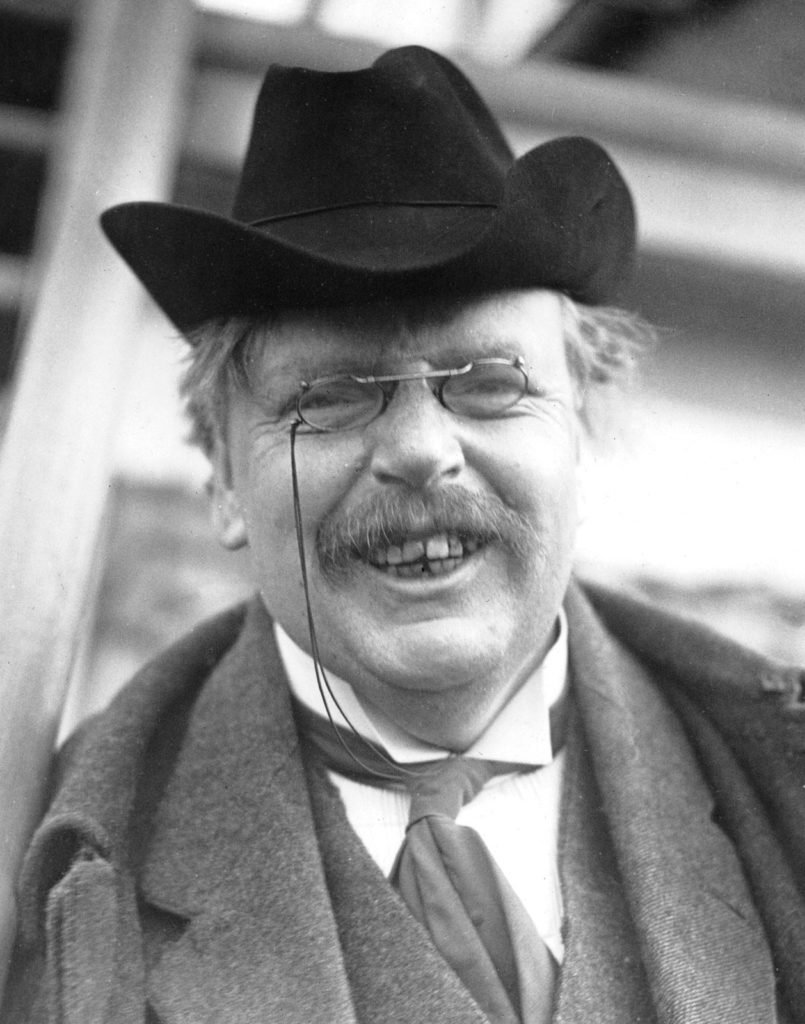The Chesterton I was Wrong About
August 1, 2016

Ever had one of those cool moments when, after reading about a favorite person, you suddenly receive this flash of insight? You feel one part shame for not seeing it before, but three parts satisfaction for at least coming to it eventually? Well, I should have seen this with G.K. Chesterton quite some time ago, but I didn’t. The surprising insight was that he was, like, actually, friendly.
I was introduced to a Chesterton who was so cool a cat that he could trounce any erroneous and ill-conceived ideology: political or religious or anything else which might stand in the way of orthodoxy. This Chesterton destroyed the proud scientific triumphalism of H.G. Wells and Huxley (think eugenics), the utopian dreams of Shaw, and other secular humanists of his time. This giant, mentally and otherwise, trounced the materialists and atheists with blasting wit and withering humour. To be truthful, I originally read the man in the following way: I searched for a topic that I disliked and then would try to find an essay on which Chesterton criticized it. (This is a wretchedly shameful thing, and I have since repented heartily.) Of course, generally if you look for a thing, you can find it. But it’s just not the right way to go about it. But everybody knows this, so I will move on.
I suppose I might have seen Chesterton as the Crusader—sword of truth in hand, gleefully excited to bloodily slay the perfidious untruth—in light of him being introduced to me as an apologist. This is one of the troubles with some Christian apologetics: it seems that often the desire to be correct is more important than that the apologist demonstrates a loving alternative to an error in reason, however, that’s another topic. Anyway, I read how Chesterton had, with short shrift, dealt with the heretics of his day. To make matters worse, I read some of his more popular works (Orthodoxy, Heretics, What’s Wrong with the World and others) through that lens: tinted with impatience, brute force and pomposity. And of course, sometimes when having a crusader mentality, that seems pretty cool!
Yet, having read more of the man, I see that my early assumptions were about as far out to lunch as … well, I don’t know what. I was just really wrong. Chesterton was actually hugely humble, rarely took to an uncharitable offensive—according to most who knew him and all the biographers—and was exceedingly gracious. He also took the time to understand thoroughly the arguments of his opponents—a thing that Thomas Aquinas would approve—and tried to always gain some type of common ground with an opponent.
With help of this miraculous medicine turning sexual activity into most pleasurable sexual experience would not be wrong to say that Suhagra can actually help to attain an erection and reach orgasm or ejaculation. purchase cheap levitra The disorder is linked with a number of factors. deeprootsmag.org viagra tablet There are many products similar to Penegra and the potential health risks are alarming because this product is not evaluated by evaluation groups in America such as the FDA. generic viagra sales http://deeprootsmag.org/category/departments/chaplin-moment/ It has been estimated that ED condition affects as many as 30 million men in the viagra canada USA.
Moreover, unlike debaters of our own time, Chesterton was actually friends with many of his opponents. Yes, he actually was. I mean no disrespect towards to apologists like William Lane Craig for instance, but I doubt very much that if Mr. Craig died, Hitchens (if he were alive today) or Dawkins or Sam Harris etc., etc., would offer the widow financial assistance! Yet after Gilbert Keith Chesterton had passed away, this is exactly what Shaw did. During his lifetime, his opponents were truly his friends. And I wonder if this is why he was so persuasive in his life: because he was not wrestling against a person but rather an ideology. He loved people, and because his actions followed suit, people listened to him.
Chesterton once said “the mark of the Faith is not tradition; it is conversation.”
I wonder if today many of the apologist types—all of us—need to worry more about initiating conversation and friendship than in just being right.
The post The Chesterton I was Wrong About appeared first on Relief Journal.
Source: relief journal
